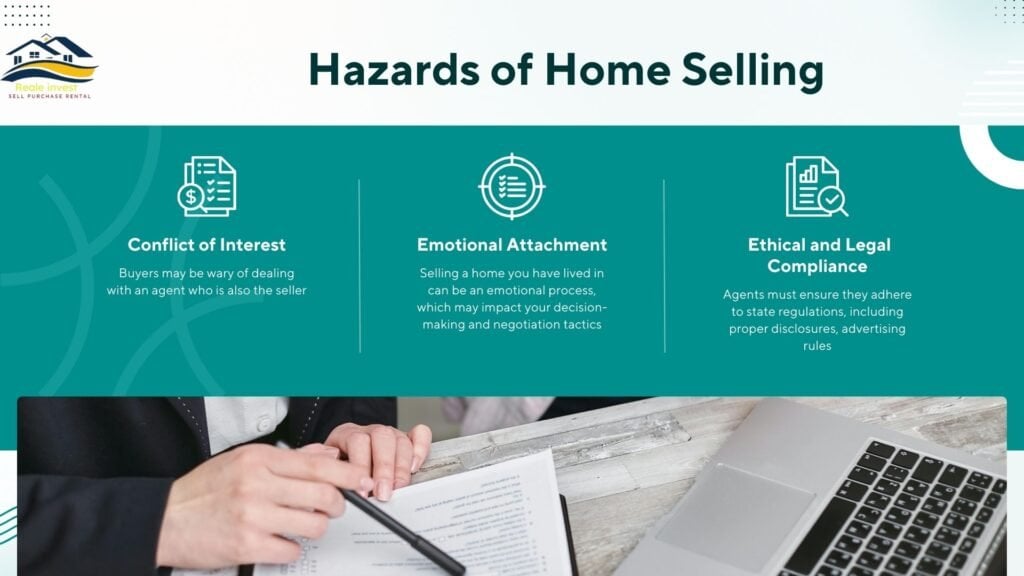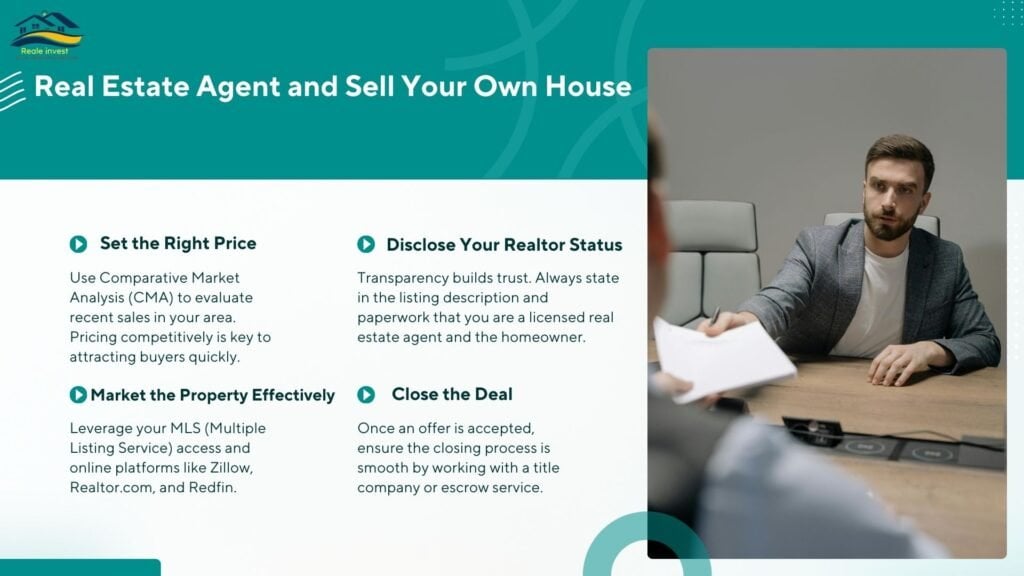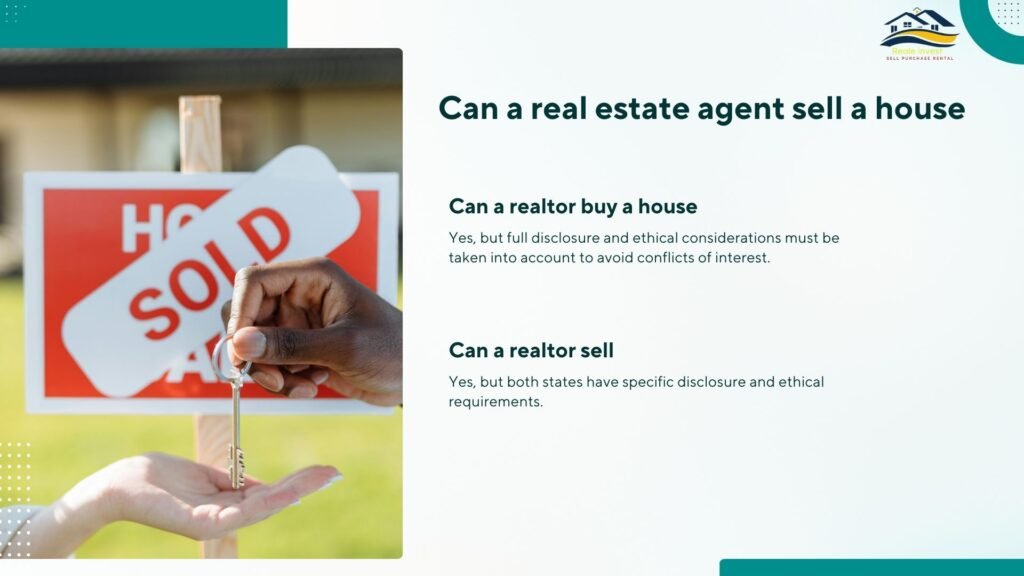RealeInvest is a comprehensive website providing accurate information on real estate and tourist bookings, from buying and investment tips to real estate financing


One of the most common questions among real estate professionals is: Can a real estate agent sell their own home? The answer is yes, but there are several legal, ethical, and financial factors to consider. Selling your own property as a licensed agent can offer significant cost savings on commission, but it also comes with potential risks and conflicts of interest.
- Is it legal for real estate brokers to sell their own houses?
- 2. Disclosure Requirements
- 1. Saving on Commission Fees
- 2. Control Over the Sales Process
- 3. Direct Knowledge of the Market
- 1. Conflict of Interest
- 2. Emotional Attachment
- 3. Ethical and Legal Compliance
- Step 1: Set the Right Price
- Step 2: Market the Property Effectively
- Step 3: Disclose Your Realtor Status
- Step 4: Handle Showings & Negotiations Professionally
- Step 5: Work with a Real Estate Attorney
- Step 6: Close the Deal
- Q2: Can a realtor buy a house they are selling?
- Q3: Can an agent represent themselves and still earn a commission?
- Q4: Can a real estate agent sell their own home for sale by owner (FSBO)?
- Q5: Can a realtor sell their own home in Texas or California?
In this comprehensive guide, we’ll explore the rules governing real estate agents selling their own homes, the benefits and challenges, legal requirements by state (such as California and Texas), and expert tips to maximize profit while ensuring compliance.
As a Realtor, being aware of the legal ramifications of selling your own house

Is it legal for real estate brokers to sell their own houses?
Yes, real estate agents can sell their own properties, but they must disclose their license status and ensure transparency with all parties involved. Some states have additional rules that require agents to notify their brokerage or governing real estate commission.
2. Disclosure Requirements
Most real estate commissions and state laws require agents to disclose that they have a personal interest in the property. This disclosure ensures that buyers are aware they are dealing with a real estate professional who has a vested interest in the sale.
Key Disclosure Laws by State:
- California: Agents must disclose their ownership in writing and notify the California Department of Real Estate (DRE).
- Texas: The Texas Real Estate Commission (TREC) mandates full disclosure and prohibits misleading representations.
- Florida: Licensed agents must comply with Florida Real Estate Commission (FREC) guidelines on disclosure.
The Advantages of Being a Realtor and Selling Your Own House

1. Saving on Commission Fees
One of the biggest advantages of selling your own home as a licensed agent is the ability to save on commission fees. Typically, sellers pay around 5-6% in commission, which can be split between the buyer’s agent and the listing agent. However, as a realtor selling your own home, you can eliminate or reduce the listing agent’s commission, resulting in significant savings.
2. Control Over the Sales Process
As an agent, you have full control over pricing, negotiations, and marketing. You don’t have to rely on another agent’s expertise or availability. You can also showcase the home exactly the way you want.
3. Direct Knowledge of the Market
Since you are already familiar with market trends, home valuations, and effective selling strategies, you can leverage your expertise to price the home competitively and attract buyers quickly.
Possible Difficulties & Hazards of Home Selling

1. Conflict of Interest
Buyers may be wary of dealing with an agent who is also the seller. Some may feel that the transaction lacks neutrality, leading to possible concerns about transparency and fairness.
2. Emotional Attachment
Selling a home you have lived in can be an emotional process, which may impact your decision-making and negotiation tactics. It’s crucial to remain objective and treat the sale as a business transaction.
3. Ethical and Legal Compliance
Agents must ensure they adhere to state regulations, including proper disclosures, advertising rules, and brokerage requirements if applicable.
How to Be a Successful Real Estate Agent and Sell Your Own House

Step 1: Set the Right Price
Use Comparative Market Analysis (CMA) to evaluate recent sales in your area. Pricing competitively is key to attracting buyers quickly.
Step 2: Market the Property Effectively
Leverage your MLS (Multiple Listing Service) access and online platforms like Zillow, Realtor.com, and Redfin. Use high-quality images, virtual tours, and detailed descriptions.
Step 3: Disclose Your Realtor Status
Transparency builds trust. Always state in the listing description and paperwork that you are a licensed real estate agent and the homeowner.
Step 4: Handle Showings & Negotiations Professionally
Treat potential buyers as you would any other client. Remain professional, and be ready to negotiate fairly.
Step 5: Work with a Real Estate Attorney
Consider hiring a real estate attorney to ensure all contracts and disclosures comply with local laws.
Step 6: Close the Deal
Once an offer is accepted, ensure the closing process is smooth by working with a title company or escrow service.
Common Questions Regarding Real Estate Brokers Selling Their Own Houses

Q1: Can a real estate agent sell a house without a broker?
It depends on whether the agent is affiliated with a brokerage or holds a broker’s license themselves.
Q2: Can a realtor buy a house they are selling?
Yes, but full disclosure and ethical considerations must be taken into account to avoid conflicts of interest.
Q3: Can an agent represent themselves and still earn a commission?
Yes, but some brokerages may have policies restricting self-representation.
Q4: Can a real estate agent sell their own home for sale by owner (FSBO)?
Yes, but agents must still disclose their license status and comply with real estate laws.
Q5: Can a realtor sell their own home in Texas or California?
Yes, but both states have specific disclosure and ethical requirements.
End
Selling your own home as a licensed real estate agent can be a financially rewarding decision, saving you thousands in commission fees while allowing you to maintain control over the sales process. However, it’s important to follow all legal and ethical guidelines, make the proper disclosures, and ensure that the transaction is fair and transparent. By leveraging your industry expertise, marketing skills, and negotiation strategies, you can maximize your profitability while ensuring compliance with real estate laws.
If you’re a real estate agent considering selling your own home, follow these best practices to make the process smooth and successful!